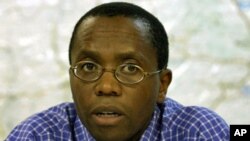Two Rwandans have gone on trial in the German city of Stuttgart, facing charges of war crimes and crimes against humanity. Ignace Murwanashyaka and Straton Musoni are accused of ordering militias to carry out mass murder and rape.
The two men are alleged to be leaders of the Democratic Forces for the Liberation of Rwanda, more commonly known as the FDLR.
They are accused of ordering militias to kill and rape in the eastern Democratic Republic of Congo in 2008 and 2009. They are being prosecuted in Stuttgart under a law that allows Germany to prosecute foreigners for crimes committed elsewhere.
Ricarda Lang is defense lawyer for Murwanashyaka. She spoke to reporters outside the court on Wednesday.
The trial is politically motivated, she says, and until the day of the trial the defense did not have access to the complete files. They were blocked, she says, by the United Nations.
Human rights groups say the FDLR has deliberately killed civilians in eastern DRC, including women and children.
The two men on trial were not in the DRC when the crimes were allegedly committed, but the prosecution says they gave the orders from their base in Germany.
The U.N. says the trials are a breakthrough. The U.N. Security Council has made repeated calls for European countries to bring FDLR commanders living abroad to justice.
Carla Ferstman, from the Britain-based human rights organization REDRESS, says Europe is moving in the right direction. "In a number of European countries there have been moves in recent years to establish specialized units dedicated to investigating and prosecuting these kinds of individuals who are found mainly within their territories. It's a really important move because certainly international criminal courts can only prosecute a handful of these types of criminals and it's very difficult to extradite them back to the countries where they came from," she said.
The FDLR was set up by some of those accused of taking part in Rwanda’s genocide in 1994. It now operates in the eastern DRC, a region that has been wracked by deadly violence for over a decade.
Ferstman says this trial is important for victims of the FDLR’s violence. A lot of the crimes that the FDLR has been accused of involve significant rape and sexual violence of masses of populations in eastern DRC. We have heard a lot about this but this is one of the first significant cases where this will be addressed,” she states. “So it's quite important from the perspective of the victims who are there and hopefully it will serve some kind of deterrent effect.
A third alleged FDLR leader, Callixte Mbarushimana, was arrested by French police last year.
He was transferred to The Hague in January and is awaiting trial at the International Criminal Court.
DRC War Crimes Trial Begins in Germany




